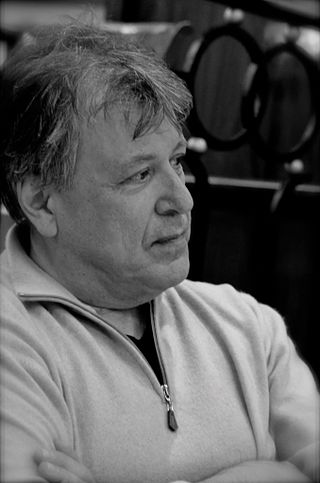Related Research Articles

A nocturne is a musical composition that is inspired by, or evocative of, the night.

Alexander Nikolayevich Scriabin was a Russian composer and virtuoso pianist. Before 1903, Scriabin was greatly influenced by the music of Frédéric Chopin and composed in a relatively tonal, late Romantic idiom. Later, and independently of his influential contemporary, Arnold Schoenberg, Scriabin developed a much more dissonant musical language that had transcended usual tonality but was not atonal, which accorded with his personal brand of metaphysics. Scriabin found significant appeal in the concept of Gesamtkunstwerk as well as synesthesia, and associated colours with the various harmonic tones of his scale, while his colour-coded circle of fifths was also inspired by theosophy. He is often considered the main Russian Symbolist composer and a major representative of the Russian Silver Age.
In music, the mystic chord or Prometheus chord is a six-note synthetic chord and its associated scale, or pitch collection; which loosely serves as the harmonic and melodic basis for some of the later pieces by Russian composer Alexander Scriabin. Scriabin, however, did not use the chord directly but rather derived material from its transpositions.
Prometheus: The Poem of Fire, Op. 60 (1910), is a tone poem by the Russian composer Alexander Scriabin for piano, orchestra, optional choir, and clavier à lumières or "Chromola". Prometheus is only loosely based on the myth of Prometheus. It premiered in Moscow on 2 March 1911. A typical performance lasts about 20 minutes.
The Piano Sonata No. 7, Op. 64, subtitled Messe Blanche, was written by Alexander Scriabin in 1911. As one of the late piano sonatas of Scriabin's career, the music is highly chromatic and almost atonal. George Perle says that, "the primary set upon which the Seventh Sonata is based," is, in linear order as spelled by Scriabin, E, F♯, G, A, B♭, C, D♭, and that the mystic chord may be derived from the quartal spelling of this set.
Étude in D-sharp minor, Op. 8, No. 12, is an étude for piano composed by Alexander Scriabin in 1894. It features many technical challenges, including numerous jumps in the left hand, repetitive chord strikes, and abundant octaves. It is a particular favorite among pianists and audiences alike. This piece was a favorite encore of Vladimir Horowitz.
G major is a major scale based on G, with the pitches G, A, B, C, D, E, and F♯. Its key signature has one sharp. Its relative minor is E minor and its parallel minor is G minor.
F-sharp major is a major scale based on F♯, consisting of the pitches F♯, G♯, A♯, B, C♯, D♯, and E♯. Its key signature has six sharps.
F-sharp minor is a minor scale based on F♯, consisting of the pitches F♯, G♯, A, B, C♯, D, and E. Its key signature has three sharps. Its relative major is A major and its parallel major is F-sharp major.

Andrei Gavrilov is a Swiss pianist of Russian background.
Alexander Scriabin's Prelude Opus 51 No. 2 is the second of his Quatre Morceaux op. 51, published in 1906. It is notated in A minor. It is written in a 6/8 beat in 30 measures and should be expressed Lugubre (dire).
Alexander Scriabin's Symphony No. 3 in C minor, entitled Le Divin Poème, was written between 1902 and 1904 and published in 1905. It was premiered in Paris on 29 May of that year.
The Piano Sonata No. 6, Op. 62, by Alexander Scriabin was composed in 1911. Although it was named the sixth sonata, the piece was preceded by the Sonata No. 7. As it is one of the late piano sonatas of Scriabin's career, the music consists of a single movement and is almost atonal, although it is sometimes listed as being in the key of G. Scriabin reportedly never played the sonata in public, because he feared its darkness.
Alexander Scriabin's Prelude, Op. 74, No. 2, entitled Très lent, contemplatif, is one of five preludes in Op. 74, composed in late 1914.
Alexander Scriabin's Symphony No. 2, Op. 29, in C minor was written in 1901 and first performed in St Petersburg under Anatol Lyadov on 12 January 1902.
The Piano Sonata No. 1 in F minor, Op. 6, by Alexander Scriabin, was the third of twelve piano sonatas that he composed. It was completed in 1892. The music is emotionally charged as much of the music was written after Scriabin had damaged his right hand through excessive piano playing.
Alexander Scriabin's Fantasie in B minor, Op. 28, was written in 1900. This is a single sonata form movement which bridges the gap between Scriabin's third and his fourth sonata. Scriabin wrote this piece during an otherwise compositionally unproductive period during his tenure at the Moscow Conservatory. The first edition was published by Belaieff.
Paul de Schlözer or Paweł Schlözer was a Polish pianist and teacher of German descent. He was possibly also a composer, but the only two works attributed to him may have been written by Polish composer Moritz Moszkowski.

Mikhail Voskresensky is a Russian pianist who left Russia for the United States in 2022 protesting against Russian invasion of Ukraine.

Leonid Leonidovich Sabaneyev or Sabaneyeff or Sabaneev was a Russian musicologist, music critic, composer and scientist. He was the son of Leonid Pavlovich Sabaneyev, a famous hunting expert, and his brother Boris was also a musician.
References
- ↑ Leonid Sabaneev: Erinnerungen an Alexander Skrjabin. Verlag Ernst Kuhn 1925/2005. (p8) ISBN 3-928864-21-1